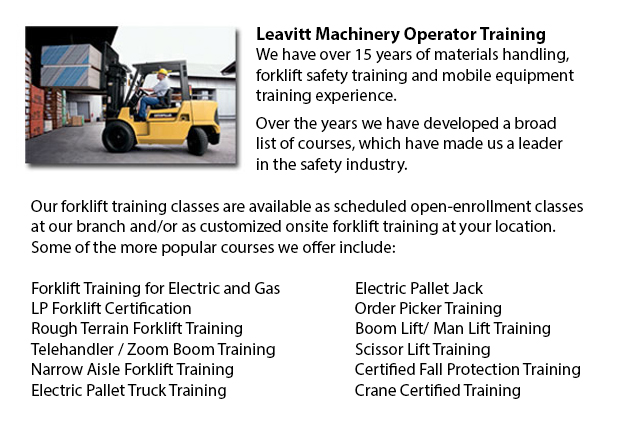
Forklift License Richmond Hill - In North America, acquiring forklift certification or a forklift license involves hands-on and classroom training. Regulatory control over training, licensing and certification for powered industrial truck operators falls under the jurisdiction of provincial, federal and state groups. Operators could get a license either by a third party or through training administered by the employer. Regardless, regulatory requirements should be met. Recertification is needed every two to three years.
Forklifts are powered industrial trucks which come with various alternatives, like for instance sit-down and stand-up. There are different types and sizes of forklift suitable for various industrial applications. Operator training courses are often individualized to address the specific kinds and uses for which the operator is training. Training on a gas-powered, sit-down forklift in a warehouse setting will not be the same as training on a propane-powered, stand-up lift truck within a shipyard. The various lift trucks and their uses makes it impossible to establish universal licensing requirements for all machinery and industries. Regulatory standards, thus, tend not to concentrate on particular course requirements but rather on the outcome of individual training programs.
On the job training that is provided by the employer is the most common method of forklift training certification and licensing. The employer who offers this method of certification is required to offer classroom sessions and practical training on machinery at their place of work. Employers may choose to train personnel on each and every kind of forklift separately, or to train them on all equipment combined. The program incorporates lift truck operation procedures, safety measures, company rules and lift truck maintenance. Topics particular to the worksite, such as hazardous materials or conditions, should be covered. Following classroom learning, operators are taught how to safely use and operate each kind of lift truck on the worksite.
When utilizing a third party trainer, the certification process will typically consist of an on-site component with hands-on practice.
Usually, a certification provided by an employer will not transfer from the existing employer to the next employer. Acquiring a forklift license through employer-provided training allows the operator to operate a lift truck for that employer only.
The most significant factor of forklift license training is forklift safety. The exact safety training requirements vary from one type of machinery to another. Safety problems differ from employer to employer, and from industry to industry. Both third-party providers and employer-provided training might have to deal with additional requirements for safety training in applicable industries, such as in offshore and marine operations.
-
Scissor Lift Certification Richmond Hill
Scissor Lift Certification Richmond Hill - Scissor lift platforms are utilized at work sites in order to allow tradespeople - like for example welders, masons and iron workers - to reach their work. Operating a scissor lift platform is usually second... More -
Narrow Aisle Forklift / Order Picker Training / Electric Pallet Jack / Electric Pallet Truck Training in Richmond Hill
A pallet jack is a model of equipment specialized in the transporting of pallets of many dimensions and weights. They might be utilized as an appendage for lift trucks, cranes and other types of heavy machinery or be used on their own. Pallet jacks a... More -
Heavy Equipment Operator Certification Richmond Hill
Heavy Equipment Operator Certification Richmond Hill - The heavy equipment operator is a person who manipulates the controls and drives various kinds of big machinery. Heavy machinery is most frequently used on construction sites in order to deliver... More -
Loader Training Richmond Hill
Loader Training Richmond Hill - Why You Must Finish A Loader Training Course - Individuals wanting work in businesses that use lift trucks must undergo a Loader Training program prior to becoming a certified operator of a lift truck. There are lots o... More -
Manlift Training Richmond Hill
Manlift Training Richmond Hill - Various manlift training programs consist of the review and content of manlift devices. An important part of the course is the practicum where students show their knowledge and practical ability to safely operate a ma... More -
Fall Protection Training in Richmond Hill
There are many injuries at work associated to falling and a lot of fall-related deaths reported every year. Most of these instances could have been prevented with better training, better measures in place, and by correctly equipping personnel before... More -
Wheel Loader Training Richmond Hill
Wheel Loader Training Richmond Hill - Commonly, the various kinds of heavy equipment training are classed into 2 categories of machinery: those which have rubber tires and tracked vehicles. Tracked vehicles consist of items like cranes, bulldozers an... More -
Forklift Certification Schools Richmond Hill
Forklift Certification Schools Richmond Hill - Forklift Certification is mandatory in North America. Hence, forklift training programs are important both for companies and for people seeking jobs in industries as forklift operators. Forklift training... More

Forklift Training Richmond Hill
TOLL FREE: 1-888-254-6157
Richmond Hill, Ontario
forklifttrainingrichmondhill.com
Email Us
About Us


